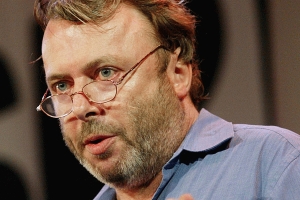Christopher Hitchens on What’s Most Obvious About 9/11

Hitchens always speaks his mind, and that’s always good, even when he’s not right. So he’s told us that God is not great and that, in fact, God ruins everything. He’s the most resolute opponent of tyranny around, and, for him, God is a tyrant who animates tyrants.
I think he’s wrong about God. But you have to hand it to Hitchens. He’s an atheist who knows evil and evildoers when he sees them. That means he knows virtue and the virtuous—such as our courageous police and firefighters—when he sees them too. For Hitchens, what seemed most obvious to us initially about 9/11 was, in fact, what was most obvious—and so “the main point” we should remember this week:
To the government and most of the people of the United States, it seemed that the country on 9/11 had been attacked in a particularly odious way (air piracy used to maximize civilian casualties) by a particularly odious group (a secretive and homicidal gang: part multinational corporation, part crime family) that was sworn to a medieval cult of death, a racist hatred of Jews, a religious frenzy against Hindus, Christians, Shia Muslims, and “unbelievers,” and the restoration of a long-vanished and despotic empire.
That means the “desire to say that the 9/11 atrocities were in some way deserved, or made historically more explicable, by the many crimes of past American foreign policy” is “perverse”—or just doesn’t square with what a rational person can see with his own eyes. It’s the kind of blindness that comes with a willful denial of the truth.
The same goes, of course, for “the contemporary comments of the ‘Reverends’ Jerry Falwell and Pat Robertson” about 9/11 “being a punishment from heaven for American sinfulness.”
For Hitchens, there are “left” (or theoretical/intellectual) and “right” (or theological) explanations for the suffering and death of ordinary Americans caused by the attacks that deny that our anger makes any sense. They are in his secular, morally responsible, republican, scientific, freedom-loving mind, “more or less identiical” in not holding our enemies responsible for what they’ve done. So they are identical in denying the facts we can see with our own eyes.
Hitchens reminds us of the various fantastic accounts of the 9/11 events as some “U.S. or Jewish plot” circulate not only in the Muslim world but throughout the West. And it gives him a special pleasure to remind us of a book published by the American, Presbyterian Westmister/John Knox Press that claims that those events “were planned in order to furnish a pretext for intervention in the Middle East.”
One of his conclusions is that too many of our 9/11 celebrations will be all about dissing the anger that should be aroused by the truth of the obvious version of what happened:
So, although the official tone of this month’s pious commemorations will stress the victims and their families (to the pathetically masochistic extent of continuing to forbid much of the graphic footage of the actual atrocities, lest “feelings” and susceptibilities be wounded), it is quite probable that those who accept the conventional “narrative” are, at least globally, in a minority.
I’ll have more to say about Hitchens’ excellent, most empirical comments in another post. But for now: Let our 9/11 remembrances begin with an acknowledgment of what really happened, and so with the anger that corresponds to genuine understanding.





